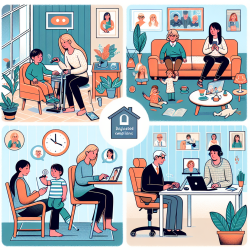The rising prevalence of pediatric behavioral health disorders presents a significant challenge, particularly in rural areas where access to specialized care is limited. The study "Evaluating a Project Extension for Community Health Outcomes Pediatric Behavioral Health Series in a Rural and Frontier State: An Exploratory Investigation" sheds light on an innovative approach to addressing this issue through the Project ECHO model.
Understanding the Challenge
Idaho, predominantly rural, ranks low in youth mental health resources. The scarcity of pediatricians and psychiatrists exacerbates the challenge, leaving many children without necessary diagnoses or treatment. Barriers such as cultural stigma and economic constraints further hinder access to care.
The Project ECHO Solution
Project ECHO (Extension for Community Health Outcomes) connects rural healthcare providers with specialists through tele-mentoring. This model aims to enhance provider knowledge and skills, enabling them to manage complex health conditions within their communities effectively.
The Pediatric Behavioral Health Series
ECHO Idaho launched a 10-session series focusing on pediatric behavioral health. This initiative aimed to equip Idaho providers with the necessary skills to diagnose and treat these conditions effectively. The series was well-received, with participants reporting increased knowledge and competence.
Key Findings from the Research
- High Satisfaction: Participants expressed high satisfaction with the sessions, noting significant improvements in their clinical practice skills.
- Knowledge Gains: Providers reported enhanced understanding of pediatric anxiety, depression, ADHD, and nonpharmacological treatment modalities.
- Competency Improvement: The series improved providers' abilities to use evidence-based screening tools and manage crisis care for families.
- Networking Opportunities: Participants valued the peer network established through the series, which facilitated collaborative care approaches.
Implications for Practice
This research underscores the potential of tele-education models like Project ECHO to bridge gaps in healthcare access and expertise in rural areas. By participating in such programs, practitioners can enhance their skills and improve patient outcomes significantly. The study also highlights the importance of continuous learning and peer collaboration in overcoming healthcare challenges.
Encouraging Further Research
The findings encourage further exploration into expanding such programs' scope and duration. Future research could assess long-term impacts on patient outcomes and explore additional topics relevant to rural healthcare needs.
Conclusion
The Project ECHO Pediatric Behavioral Health series demonstrates a promising approach to addressing pediatric mental health challenges in rural communities. By empowering local providers with specialized knowledge and skills, this model can significantly improve care accessibility and quality for underserved populations.
To read the original research paper, please follow this link: Evaluating a Project Extension for Community Health Outcomes Pediatric Behavioral Health Series in a Rural and Frontier State: An Exploratory Investigation.










